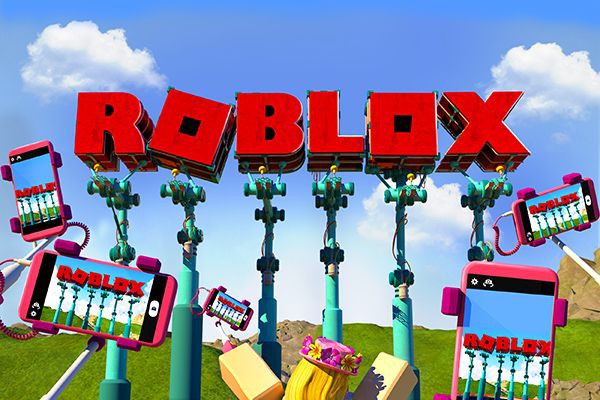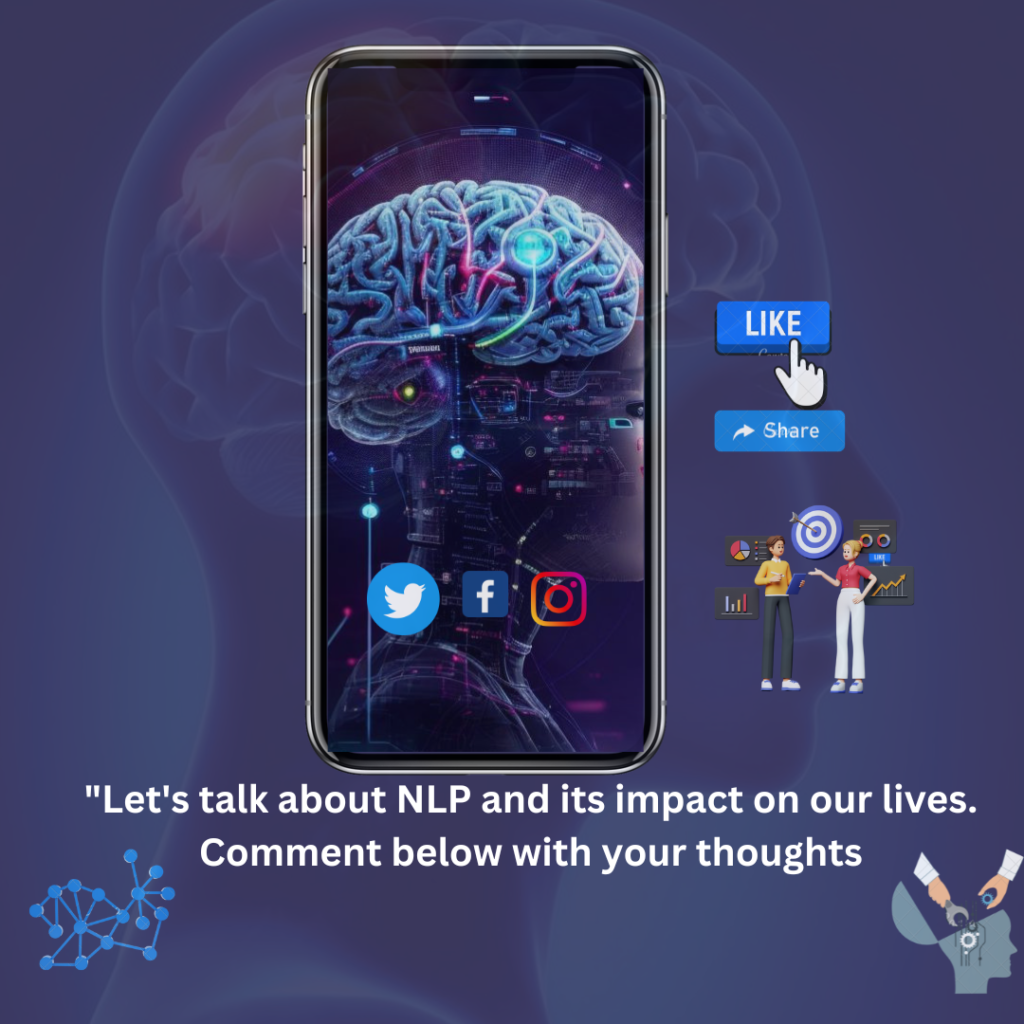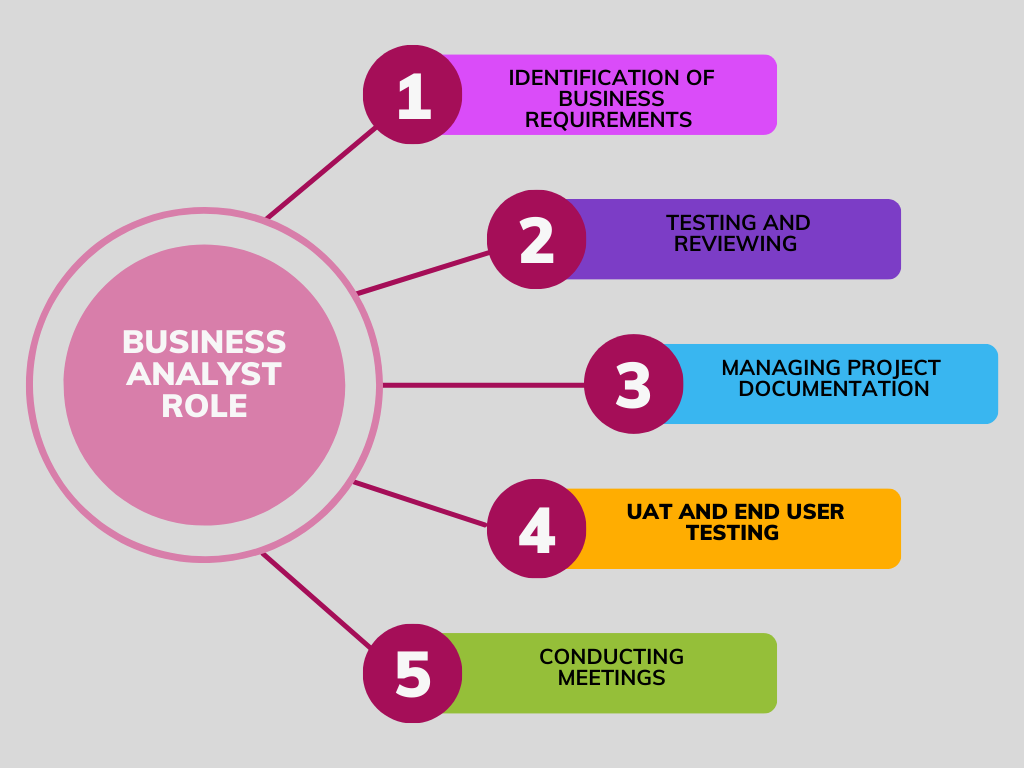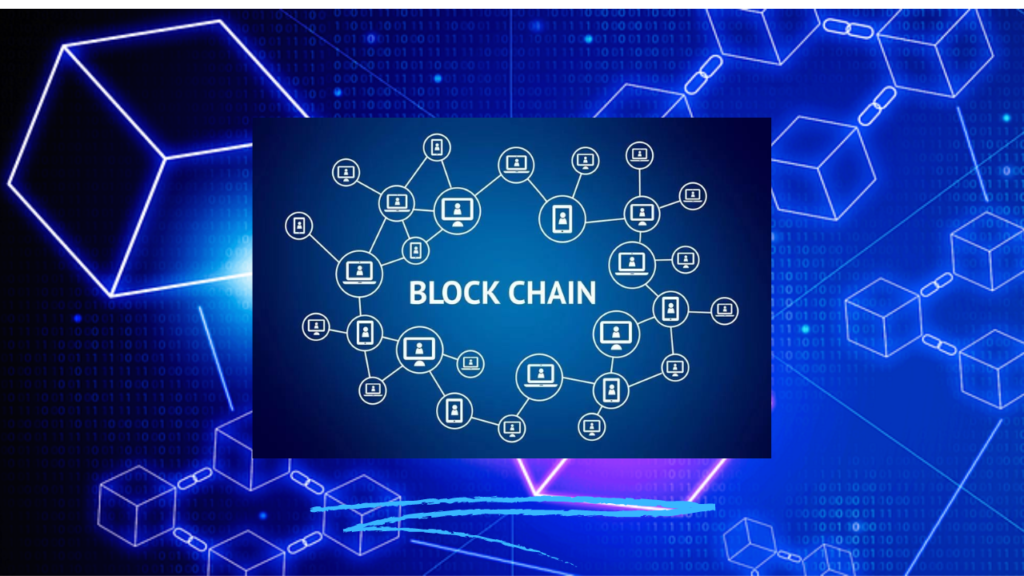
Introduction
The world was first introduced to the Blockchain with the advent of Bitcoin in 2009. Since then, blockchain has become a disruptive force across various industries, driving significant changes, especially in the financial sector.
Blockchain technology is commonly utilized in cryptocurrency systems like Bitcoin, but it possesses various other potential applications as well. One such example could be, blockchain could track the provenance of goods, maintain medical records, or manage supply chains.
Here are some of the benefits of Blockchain technology:
Transparency: Blockchain is a transparent ledger, meaning that all transactions are recorded and visible to all participants in the network. This can help to reduce fraud and corruption.
Security: Blockchain is a secure ledger, meaning that transactions are difficult to tamper with or hack. This is because each block in the chain is linked to the previous block, and any changes to one block would require changes to all subsequent blocks.
Efficiency: Blockchain can help to streamline and automate business processes. This is because blockchain eliminates the need for intermediaries, such as banks or clearinghouses.
Blockchain technology is still in its early stages of development, but it has the potential to revolutionize many industries. As blockchain technology matures, we can expect to see even more innovative applications of this powerful technology.
- The Role of a Blockchain Developer
- Skills Required for Blockchain Developer
- Education and Training for Blockchain Developers
- Career Paths in Blockchain Development
- Job Market Overview
- The Work Environment for Blockchain Developers
- Challenges in Blockchain Development
- Real-world Applications of Blockchain
- Resources for Aspiring Blockchain Developers
- Frequently Asked Questions
The Role of a Blockchain Developer
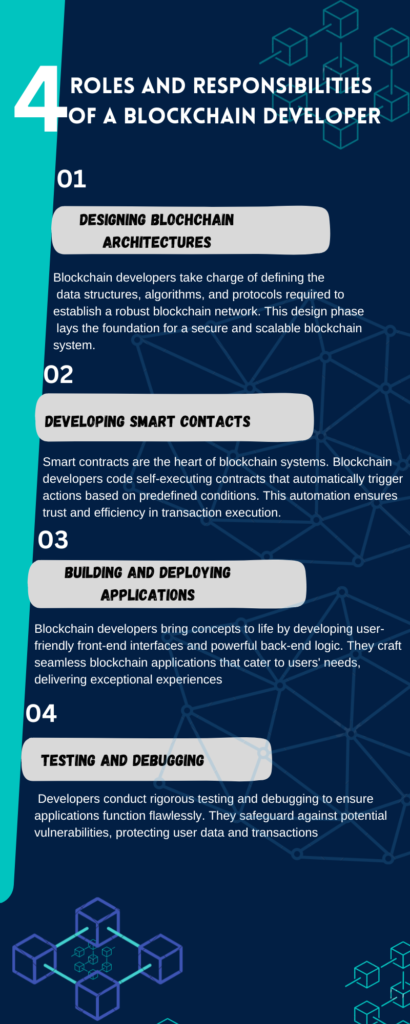
Much like architects of the digital world, Blockchain developers design and implement the backbone structure for decentralized applications.
Blockchain developers are responsible for designing, developing, and maintaining blockchain-based applications. They work with a variety of stakeholders, including business analysts, project managers, and other developers, to ensure that blockchain solutions meet the needs of the organization.
Specifically, blockchain developers:
- Design and develop blockchain architectures. This includes defining the data structures, algorithms, and protocols that will be used to create the blockchain network.
- Develop smart contracts. Smart contracts are self-executing contracts that are stored on the blockchain. They can be used to automate transactions and ensure that they are carried out as agreed.
- Build and deploy blockchain applications. This includes developing the front-end user interface and back-end logic for blockchain applications.
- Test and debug blockchain applications. This ensures that blockchain applications are working as expected and that they are secure from attack.
- Maintain and update blockchain applications. This includes fixing bugs, adding new features, and updating the application to keep it up-to-date with the latest blockchain technology.
Blockchain developers are in high demand as the demand for blockchain-based applications grows. If you are interested in a career in blockchain development, there are a number of skills that you will need to develop, including programming skills, cryptography skills, and distributed systems skills.
Skills Required for Blockchain Developer
Blockchain development is an interdisciplinary field, requiring expertise in computer science, cryptography, and software engineering.
| Skill | Description |
| Programming Languages | Blockchain developers should be proficient in at least one high-level programming language, such as Java, C++, Python, or JavaScript. They should also be familiar with the specific programming languages used for building smart contracts, such as Solidity or Serpent. |
| Cryptography | Blockchain technology is based on cryptography, so blockchain developers need to have a strong understanding of cryptography concepts, such as hashing, digital signatures, and public-key cryptography. |
| Distributed Systems | Blockchain is a distributed system, so blockchain developers need to have a good understanding of distributed systems concepts, such as consensus algorithms, fault tolerance, and network security. |
| Data Structures and Algorithms | Blockchain developers need to be able to design and implement efficient data structures and algorithms. This is because blockchain applications often need to handle large amounts of data and complex transactions. |
| Smart Contracts | Smart contracts are self-executing contracts that are stored on the blockchain. Blockchain developers need to be able to develop and deploy smart contracts. |
| Testing and Debugging | Blockchain applications need to be thoroughly tested and debugged before they can be deployed. Blockchain developers need to be able to write unit tests and integration tests to ensure that blockchain applications are working as expected. |
| Soft Skills | In addition to technical skills, blockchain developers also need to have strong soft skills, such as communication, teamwork, and problem-solving skills. |
This is not an exhaustive list of all the skills required for blockchain development. However, these are some of the most important skills that blockchain developers need to have. Here is the link to learn about blockchain technology
Education and Training for Blockchain Developers
While traditional computer science or software engineering degrees lay a solid foundation, specialized blockchain development education is a significant advantage.
| Course | Provider | Description |
| Blockchain Developer Nanodegree | Udacity | Covers the fundamentals of blockchain technology, including cryptography, distributed systems, and smart contracts. Also includes hands-on projects that allow you to build your own blockchain applications. |
| Blockchain Fundamentals | Coursera | Provides an introduction to blockchain technology. Covers the history of blockchain, the different types of blockchains, and the applications of blockchain technology. |
| Blockchain and Cryptocurrency Engineering | MITx | Covers the technical aspects of blockchain technology. Covers topics such as cryptography, distributed systems, and smart contracts. |
| Blockchain Certificate Program | IIT Kanpur and Simplilearn | Covers the fundamentals of blockchain technology, as well as the latest trends in blockchain development. Also includes hands-on projects that allow you to build your own blockchain applications. |
| Blockchain Bootcamp | Blockchain Council | Covers the fundamentals of blockchain technology, as well as the skills you need to become a blockchain developer. Includes live online classes, hands-on projects, and career mentorship. |
| Master of Science in Blockchain Technology | University of Nicosia | Covers the fundamentals of blockchain technology, as well as the latest trends in blockchain development. Also includes a capstone project that allows you to apply your skills to a real-world blockchain project. |
| Blockchain Developer Masterclass | Jetking | This masterclass from Jetking covers the fundamentals of blockchain technology, as well as the skills you need to become a blockchain developer. It includes live online classes, hands-on projects, and career mentorship. |
| Blockchain Developer Certification | Intellipaat | This certification program from Intellipaat covers the fundamentals of blockchain technology, as well as the latest trends in blockchain development. It also includes hands-on projects that allow you to build your own blockchain applications. |
| Blockchain Development Course | Mindmajix | This course from Mindmajix covers the fundamentals of blockchain technology, as well as the skills you need to become a blockchain developer. It includes live online classes, hands-on projects, and career mentorship. |
| Blockchain Certification Course | Edureka | This certification program from Edureka covers the fundamentals of blockchain technology, as well as the latest trends in blockchain development. It also includes hands-on projects that allow you to build your own blockchain applications. |
Career Paths in Blockchain Development
The blockchain industry offers a plethora of opportunities, from joining start-ups to freelancing, or even starting your own venture.

Here is the free resource to learn more about other career paths https://futurereadytools.com/category/careers/
Job Market Overview

Blockchain development is one of the hottest careers, with demand growing each year.
- Job market: The job market for blockchain developers is growing rapidly. The Bureau of Labor Statistics (BLS) projects that the Employment. of software developers, which includes blockchain developers, is projected to grow 22% from 2020 to 2030, much faster than the average for all occupations. This growth is being driven by the increasing adoption of blockchain technology by businesses and organizations.
- Salary range: The salary range for blockchain developers varies depending on experience, skills, and location. According to Indeed, the median annual salary for blockchain developers in the United States is $130,000. However, salaries can range from $80,000 to $200,000 or more.
- Job growth projections: The BLS projects that the number of jobs for blockchain developers will grow by 22% from 2020 to 2030. This is much faster than the average for all occupations. The growth of blockchain technology is expected to drive the demand for blockchain developers in a variety of industries, including finance, healthcare, supply chain management, and government.
- Relevant statistics: According to a survey by LinkedIn, the demand for blockchain developers is outpacing the supply. In fact, the survey found that there are 150,000 open blockchain jobs worldwide, but only 200,000 blockchain developers with the skills to fill those jobs.
A report by Global Market Insights projects that the global blockchain market will reach $39.7 billion by 2025. This growth is being driven by the increasing adoption of blockchain technology by businesses and organizations in a variety of industries.
The Work Environment for Blockchain Developers
Blockchain developers often work in dynamic, fast-paced environments.
Typical workday
A typical workday for a blockchain developer might involve the following:
- Meetings: Blockchain developers often meet with other developers, business analysts, and project managers to discuss project requirements, design, and implementation.
- Coding: Blockchain developers spend a significant amount of time coding. This includes writing new code, debugging existing code, and testing code.
- Research: Blockchain developers often need to research new blockchain technologies and applications. This research can involve reading technical papers, attending conferences, and talking to other developers.
- Documentation: Blockchain developers often need to document their code and the design of their blockchain applications. This documentation can help other developers understand the code and how the applications work.
Team structures
Blockchain developers often work in teams. These teams can be small or large, depending on the size of the project. Team structures for blockchain developers can vary, but they often include the following roles:
- Project manager: The project manager is responsible for overseeing the project and ensuring that it is completed on time and within budget.
- Business analyst: The business analyst is responsible for understanding the business requirements for the project and translating those requirements into technical specifications.
- Developers: The developers are responsible for writing the code for the blockchain application.
- Testers: The testers are responsible for testing the blockchain application to ensure that it works correctly.
Other work environment details
The work environment for a blockchain developer can vary depending on the company. However, some common work environment details for blockchain developers include:
- Collaborative: Blockchain developers often work in collaborative environments. This means that they need to be able to work well with others and communicate effectively.
- Fast-paced: The pace of work for blockchain developers can be fast-paced. This is because blockchain technology is constantly evolving, and developers need to be able to keep up with the latest changes.
- Challenging: Blockchain development can be challenging. This is because blockchain technology is complex, and developers need to have a deep understanding of the technology.
Challenges in Blockchain Development
Blockchain development is a challenging field with its set of complexities.
Here are some of the challenges that blockchain developers face:
- Rapid technology changes: Blockchain technology is constantly evolving, which can make it difficult for developers to keep up with the latest changes. This can lead to compatibility issues and security vulnerabilities.
- Scalability Issues: Blockchain networks are designed to be secure and decentralized, but this can also make them difficult to scale. As the number of users on a blockchain network increases, the network can become slow and congested.
- Legal regulations: The legal status of blockchain technology is still evolving, and this can create challenges for developers. For example, some jurisdictions may not have clear laws governing the use of blockchain technology, which can make it difficult to develop and deploy blockchain applications.
- Security threats: Blockchain networks are designed to be secure, but they are not immune to attack. For example, hackers could attempt to exploit vulnerabilities in the code or try to gain control of a blockchain network.
In addition to these challenges, blockchain developers also face challenges related to:
- Lack of skilled developers: There is a shortage of skilled blockchain developers, which can make it difficult to find qualified candidates for blockchain development jobs.
- High costs: The cost of developing and deploying blockchain applications can be high. This is because blockchain technology is still relatively new, and there are not many off-the-shelf solutions available.
- Complexity: Blockchain technology is complex, which can make it difficult to understand and use. This can be a challenge for both developers and users of blockchain applications.
Despite these challenges, blockchain technology is a rapidly growing field with a lot of potential. As the technology matures, these challenges are likely to be addressed, and blockchain will become more widely adopted.
Real-world Applications of Blockchain
From healthcare to the supply chain, the applications of blockchain are extensive and transformative.
Supply chain management: Blockchain can be used to track the movement of goods and products through the supply chain. This can help to ensure the authenticity of products, improve efficiency, and reduce fraud. For example, Walmart is using blockchain to track the movement of mangoes from farms in Mexico to stores in the United States. This has helped Walmart to reduce food waste and improve the traceability of its products.
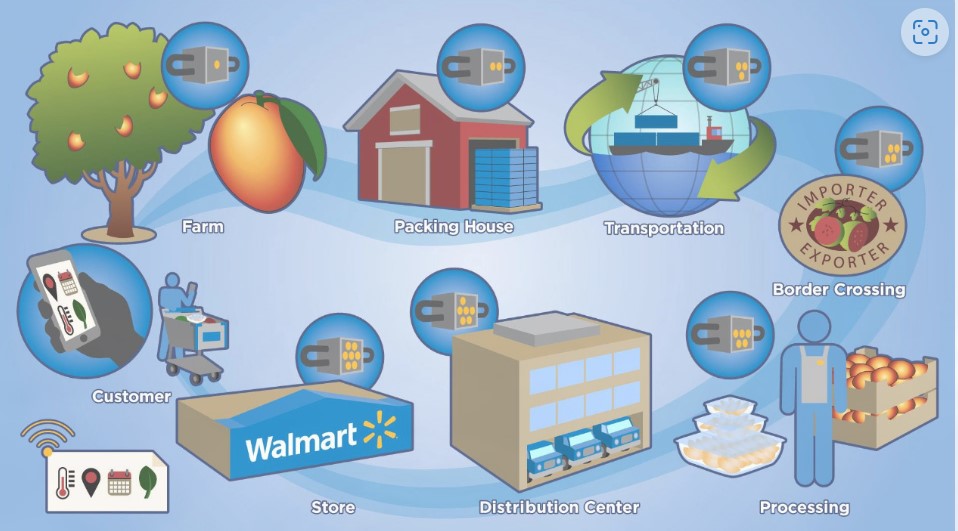
Walmart’s blockchain supply chain management
Financial services: Blockchain can be used to record financial transactions in a secure and transparent way. This can help to reduce fraud and improve efficiency. For example, banks are using blockchain to settle payments more quickly and securely.

Financial services
Healthcare: Blockchain can be used to store and share medical records in a secure and private way. This can help to improve the quality of care and reduce costs. For example, the UnitedHealthcare blockchain project is using blockchain to store and share medical records. This has helped to improve the efficiency of care and reduce costs.

Healthcare blockchain
Real estate: Blockchain can be used to record property ownership and transactions in a secure and transparent way. This can help to reduce fraud and improve efficiency. For example, the Land Registry of Sweden is using blockchain to record property ownership. This has helped to make the process of buying and selling property more efficient.

Real estate blockchain
Intellectual property: Blockchain can be used to register and track intellectual property (IP) in a secure and transparent way. This can help to reduce fraud and improve efficiency. For example, the World Intellectual Property Organization (WIPO) is using blockchain to register IP. This has helped to make the process of registering IPs more efficient.

Intellectual property blockchain
These are just a few examples of the many ways that blockchain is being used in various industries. As the technology matures, we can expect to see even more innovative applications of blockchain in the future.
Resources for Aspiring Blockchain Developers
Books:
- Mastering Bitcoin by Andreas Antonopoulos: This book is a comprehensive introduction to Bitcoin and blockchain technology.
- The Blockchain Revolution by Don Tapscott and Alex Tapscott: This book provides an overview of the history, technology, and potential applications of blockchain.
- Blockchain for Dummies by Alison Arthur: This book is a beginner-friendly introduction to blockchain technology.
Podcasts:
- Blockchain Today by CoinDesk: This podcast provides weekly news and analysis of the blockchain industry.
- Unchained by Laura Shin: This podcast interviews experts about the latest trends in blockchain technology.
- The Bad Crypto Podcast by Joel Comm and Travis Wright: This podcast is a fun and informative look at the world of blockchain technology.
Communities:
- Blockchain subreddit: This subreddit is a great place to learn about blockchain technology and discuss the latest news.
- Blockchain Stack Exchange: This forum is a great place to ask questions and get help from other blockchain enthusiasts.
Influencers:
- Andreas Antonopoulos: Andreas is a well-known Bitcoin and blockchain educator. He has written several books on the subject and hosts the popular podcast “Let’s Talk Bitcoin!”
- Don Tapscott: Don is a business strategist and author. He is the co-author of the book “The Blockchain Revolution” and hosts the podcast “Blockchain Revolution Radio.”
- Laura Shin: Laura is a journalist and podcaster. She is the host of the popular podcast “Unchained” and writes about blockchain technology for Forbes.
- Nischal Shetty: Nischal is the founder and CEO of WazirX, one of India’s leading cryptocurrency exchanges. He is a vocal advocate for blockchain technology and has spoken at several conferences and events.
- Ashish Singhal: Ashish is the founder and CEO of CoinDCX, another leading cryptocurrency exchange in India. He is also a co-founder of the Blockchain and Crypto Assets Council (BACC), an industry body that represents the interests of the blockchain industry in India.
- Sumit Gupta: Sumit is the co-founder and CEO of CoinSwitch Kuber, a cryptocurrency exchange that allows users to buy, sell, and trade cryptocurrencies with ease. He is also a member of the BACC.
- Balaji Srinivasan: Balaji is the former CTO of Coinbase, one of the world’s largest cryptocurrency exchanges. He is also the co-founder of Cred, a blockchain-based lending platform. Balaji is a frequent speaker at conferences and events and is known for his insights on the future of blockchain technology.
- Akash Banerjee: Akash is the founder and CEO of Thinkchain, a blockchain consulting firm. He is also the co-founder of the Blockchain India Foundation, a non-profit organization that promotes the adoption of blockchain technology in India.
Frequently Asked Questions
- What is blockchain development?
A. Blockchain development is the process of building decentralized digital ledgers that record and validate transactions. Blockchain development can include creating blockchain networks, designing user interfaces, developing smart contracts, or creating decentralized applications (DApps).
2. How do I get started with blockchain development?
A. Getting started with blockchain development requires understanding the basic concepts of blockchain technology and learning a programming language that’s commonly used in blockchain, like Solidity for Ethereum development. It’s also useful to learn about cryptography, P2P networks, and distributed ledger technology.
3. What programming languages are used in blockchain development?
A. The choice of programming language depends on the specific blockchain platform. Ethereum smart contracts are written in a language called Solidity. Other languages commonly used in blockchain development include JavaScript, Python, C++, and Go.
4. What are smart contracts?
A. Smart contracts are self-executing contracts with the terms of the agreement directly written into lines of code. They automatically execute transactions without the need for a third party when certain conditions are met.
5. What are decentralized applications (DApps)?
A. DApps, or decentralized applications, are applications that run on a P2P network of computers rather than a single computer. They are open-source software built on top of blockchain technology that use smart contracts to execute transactions.
6. What is Ethereum?
A. Ethereum is an open-source, blockchain-based platform that allows developers to build and deploy decentralized applications (DApps). It’s known for its smart contract functionality.
7. What is the difference between Bitcoin and Ethereum from a developer’s perspective?
A. While both Bitcoin and Ethereum are blockchain-based cryptocurrencies, they have different purposes and capabilities. Bitcoin is primarily a digital currency, while Ethereum is a platform that enables developers to build and deploy smart contracts and DApps.
9. What is the consensus mechanism in blockchain?
A. A consensus mechanism is a method used to agree on a single data value in a distributed system, like a blockchain. The most common types of consensus mechanisms in blockchain are Proof of Work (PoW) and Proof of Stake (PoS).
10. What is a private vs. public blockchain?
A. A public blockchain is open to anyone to participate and validate transactions, like Bitcoin or Ethereum. A private blockchain, on the other hand, restricts participation to invited members only. Private blockchains are often used by businesses for internal purposes.
11. How is blockchain development related to cryptocurrencies?
A. Cryptocurrencies are digital or virtual currencies that use cryptography for security, and most of them are built on blockchain technology. The development of a cryptocurrency involves creating a blockchain to support it. The blockchain serves as a distributed ledger that records all transactions involving the cryptocurrency.


